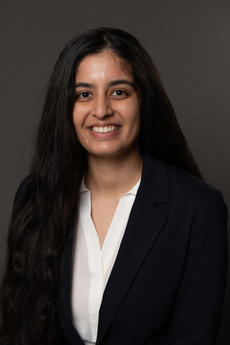Participation in MnLEND fellowship improves student's understanding of disability care
For Archita Jain, DDS ’24, disability and anti-ableism have been important topics from a young age. Those experiences shaped who she is and her career path—and they led her to an intensive fellowship during dental school.
Jain grew up with family and friends in the disability community. “It has always been a part of my life, and I have personally witnessed ableist behavior towards individuals with disabilities around me,” she reflected. “This carved an imprint in my mind.”
Jain decided that she wanted to support her loved ones and others, so she began volunteering at the age of fourteen. Experiences as a Leisure Buddy and an Integration Counselor for the city of Vaughan, Ontario taught her more about working with others, supporting individuals with disabilities and the injustices people with disabilities experience. That, in turn, led her to dentistry.
“I chose to pursue a career in dentistry after receiving feedback from families I worked with regarding the difficulties they faced with healthcare treatment—specifically oral health—as children and adults,” she said. “As a dentist, I would like to serve members of society regardless of their mental, physical, socioeconomic or ethnic status and find alternative ways to treat individuals with different statuses. I came to dental school with the intention of learning how to serve and provide care for individuals with special needs and any disability.”
With that intention front of mind, Jain connected with Neha Sethi, DDS ’22, and Sydney Malone, DDS ’22, who recommended she take part in the MnLEND program. An intensive fellowship for more than 16 disciplines at the University of Minnesota, the Minnesota Leadership Education in Neurodevelopmental and Related Disabilities “facilitates the development of leaders with the knowledge, skills and attitudes to allow them to take informed, committed action in the areas of neurodevelopmental and related disabilities.”
Over the past year, Jain underwent more than 320 hours of training and lectures, in addition to projects, clinical rotations, advocacy efforts, research and training focused on care and training on neurodevelopmental and intellectual disabilities. She was one of 26 fellows.
Jain worked directly with the Autism Mentorship Program, “which supports the transition from adolescence to adulthood by pairing autistic high school students with autistic adults in a 1-to-1 mentoring relationship where they talk and build connections,” she said. Her role was to recruit, collect data and draft a manuscript for the program’s clinical trial of online mentoring.
The fellowship experience was transformational for Jain, who learned from her coursework, her projects and her fellow healthcare professionals. “I was reminded every week of how important it is to have oral healthcare providers interested and eager to learn how to be better providers to people with disabilities,” she said. “I did not realize that the number of providers focused on helping to provide better care to individuals with neurodevelopmental disabilities was very little.”
In addition to the knowledge she gained, Jain found the fellowship incredibly personally meaningful. “My goal at the beginning of the year was to become a more well-rounded healthcare provider, and also challenge myself in areas of weakness such as advocacy, policy and research,” she said. “I was able to accomplish all of these and more as my individual project allowed me to become competent in research development and be a part of a paper publication in disability. I learned about different approaches to disability, and the nuances associated with how individuals view disability. I have grown tremendously not only as a leader, but as an individual.”
The fellowship year was difficult—Jain had to take on significant work in addition to her dental school curriculum. But she wouldn’t change what she gained from the experience for the world.
“Raised by dentist parents, throughout my journey in dental school they have always encouraged me to approach each moment as an opportunity to learn and grow as a clinician. Being a part of MnLEND has allowed me to do just that by challenging myself to ask questions and learn how to be a better provider,” she said. “I have been equipped with the resources and training to understand what it means when someone has a disability, and what that looks like on a daily basis. Because of MnLEND, I am a better provider and a better person.”
